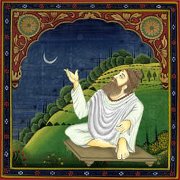 In the third episode of the podcast Nick Dagan Best and I discuss the definition of the word “astrologer”, and talk about the pros and cons of some of the different ways that people define the term.
In the third episode of the podcast Nick Dagan Best and I discuss the definition of the word “astrologer”, and talk about the pros and cons of some of the different ways that people define the term.
The central question is what does it take to be considered an astrologer? Should the term “astrologer” only be used as a professional designation, so that it only applies to people who do astrology as part of their vocation? Or can someone be labeled as an astrologer even if they don’t practice astrology professionally?
During the course of the show we touch upon topics such as professional certification, whether astrology involves belief, and what basic things you should know in order to consider yourself an astrologer. At one point we even discuss the dreaded word “astrologist”, and why it has negative connotations in some astrological circles.
Transcript
A full transcript of this episode is available: Episode 3 transcript
Download or Stream the Podcast
You can either download this episode as an MP3 or play it directly from the website by using the buttons below:
Podcast: Play in new window | Download (Duration: 1:17:21 — 35.4MB)


I just wanted to say that I really enjoyed this podcast/show. It was a living essay… very informative and even inspiring! I listened to it twice and will listen again soon. Thank you so much and I look forward to future podcasts and information on upcoming work, and also books that may already be available. Thanks so much for your work!!
Hey, thanks Melody! I appreciate the feedback. Let me know if there are any particular topics that you would like to hear us cover in the future.
I just listened to this podcast and found it really refreshing to hear a candid conversation about some of the tricky areas associated with Astrology, and identifying yourself as an Astrologer. Particularly how to resolve the issue of “I know it works, but I don’t know HOW it works!” This has been a struggle for me but I like the win-win option of seeing it as either a) real in some way we have yet to understand b) a mass delusion for-which-we-should-all-be-proud-because-of-the-sheer-strength-of-our-collective-imagination (although I just know deep down that this isn’t the case) !! Thanks for your shared insights.
Thanks for the lively discussion of the two words astrologer & astrologist almost two years ago.
From the linguistic point of view, the common suffix used to refer to a person specialized in an -ology field of expertise is an -ologist, : a pharmacologist specializes in pharmacology.
From what I have gathered from the Michael Quinion’s Ologies and Isms: A dictionary of Word Beginnings & Endings, Oxford Paperback Reference 2002, both -ist & -er are equally possible, with -ist being applied to almost all –ologies. However, astrology remains a rare exception.
Also, there may be a sociological reason why critics of astrology may want to use the -ist suffix instead of -er. Many ‘new’ & somewhat ‘unacceptable entities’ seem to have been given the ism & -ist suffixes to reflect a negative bias: communism-communist, impressionism-impressionist, fauvism-fauvist, etc.
Regardless, it would be enlightening to have the input of a Latin & Greek linguist so as to shed better light into of the linguistic conditions as to the application of either suffixes, as well as a social linguist to explain whether a negative bias is potentially implied when referring to an astrologer as an astrologist.
Tom
Intriguing question. I think the meaning of what the words mean has changed over the past few decades. It seems to me that today’s astrologers are engaging in more of a research path than twenty years ago when most astrologers were primarily readers. I think the Internet is helping ppl to earn more from research than a few decades ago via a public persona.
[…] Discussed in episode 3: The Definition of “Astrologer” with Nick Dagan Best […]
Why does he bother pronouncing it ‘Urah-nus’ if the book is called “What’s up Uranus”. The rest of the podcast was quite thought provoking as well!
And yes! Astrologers can be called an ‘astrologer’ even if they don’t take clients! Perfect example are psychologists. There are plenty academic psychologists who are still considered psychologists, even if they don’t have a practice taking clients 🙂 I mean, I’m sure it advances astrological study and research if they are actively seeing and interviewing clients, however.